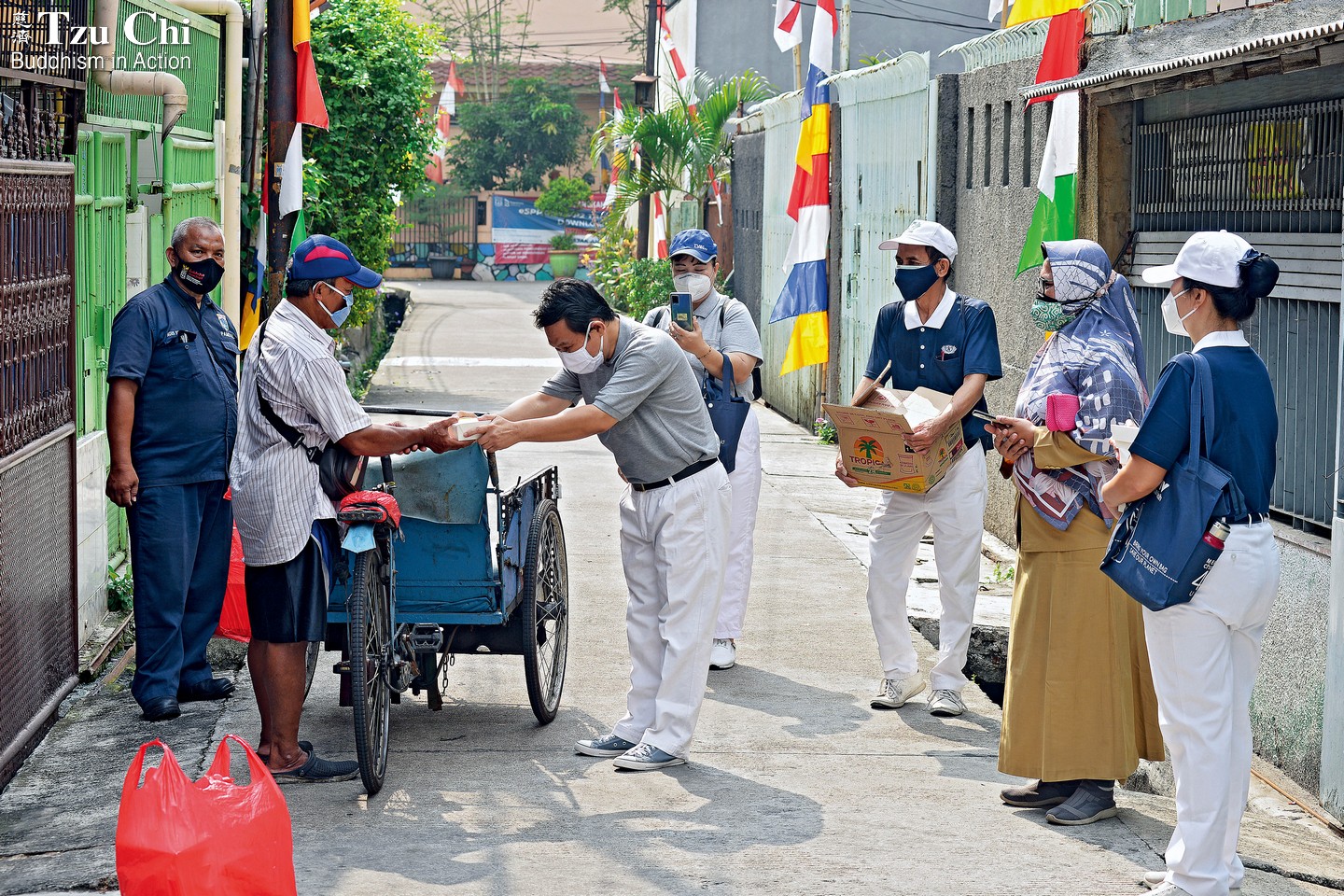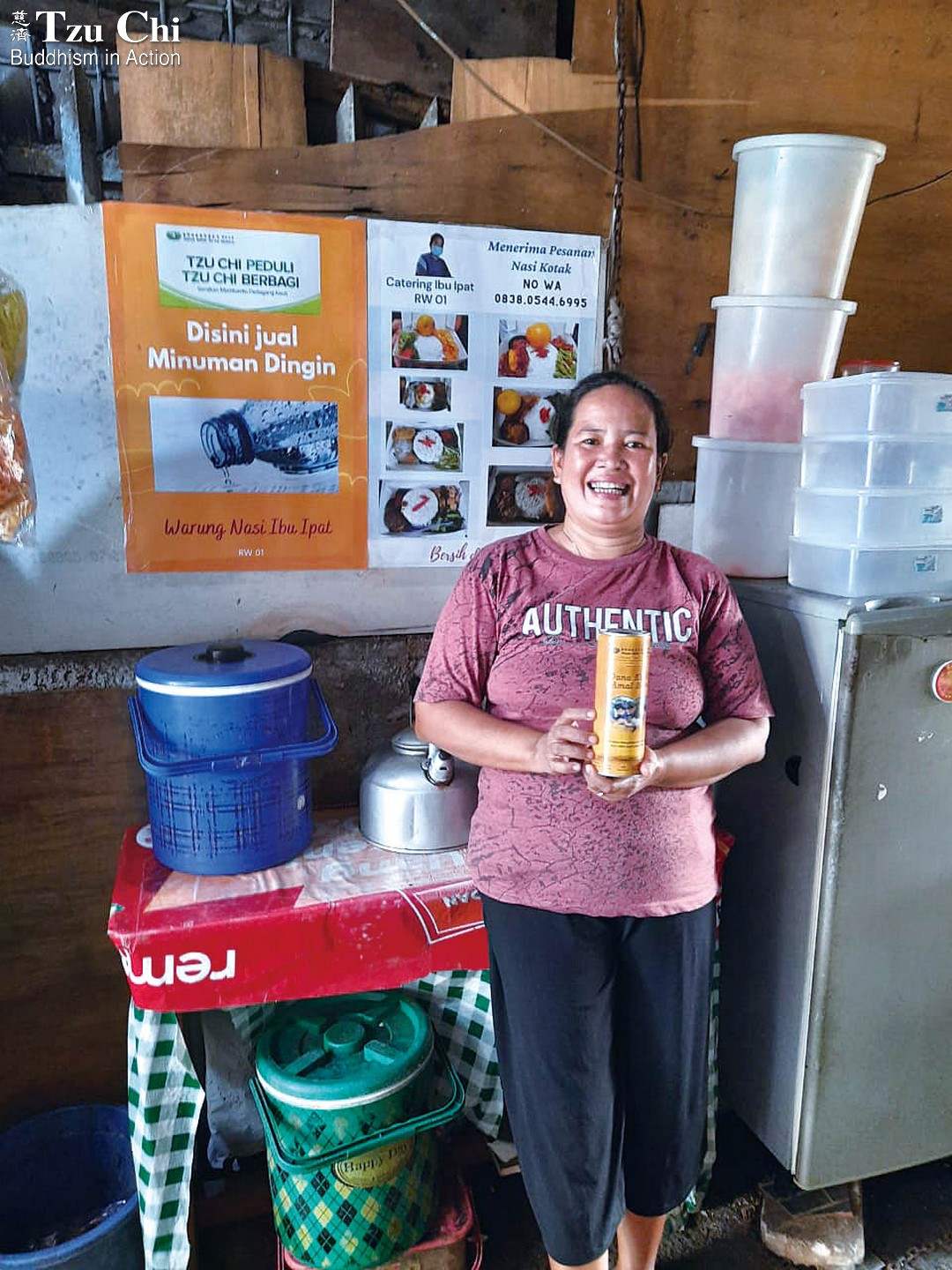Narrated by Ye Ling-wei
Compiled by Desvi Nataleni
Edited and translated by Wu Hsiao-ting
Photos courtesy of Tzu Chi Indonesia
Tzu Chi Indonesia purchased boxed meals from vendors impacted by the pandemic to distribute to the needy. Their program not only benefited the people receiving the food assistance but helped the vendors too—sometimes in surprising ways.

Tzu Chi Indonesia carried out a meal program that lasted from August 23 to the end of October 2021. The program was a win-win: it fed those in need and helped food vendors tackle the financial challenge posed by the pandemic. Volunteers in Surabaya, for example, ordered 200 vegetarian boxed meals every day from three eateries and distributed them to the underserved.
Tzu Chi Indonesia has carried out a lot of work to help people impacted by the COVID-19 pandemic. One example was a meal program offered from August 23 to the end of October 2021. Tzu Chi bought boxed meals from food vendors in Jakarta, Surabaya, and other areas affected by the pandemic and provided the food to the needy. Altogether, more than 30,000 meals were given out.
This activity put food into the hands of the underprivileged and eased financial pressure on struggling food vendors. But it helped more than these two groups of people. For example, participating vendors needed to buy ingredients to make the meals. The businesses that sold the ingredients thus benefited too. The transportation sector gained as well because their services were used to move the goods.
I live in Jakarta and was one of the volunteers who helped implement the program. Before we launched it, we visited neighborhood chiefs and asked them to provide us with lists of people who would need the food. We also asked around to find out the food preferences of residents. Our team worked with participating vendors to help them improve their services, including how to make their food taste and look better and how to practice better food hygiene. Culinary volunteer Jessica Nalasetya Winata (藍雪珠) even shared recipes with vendors to help them prepare delicious vegetarian food.
We were surprised to learn after we started working with the vendors that some of them had never received orders as large as ours were. As a result, they didn’t have a very good idea about the amount of ingredients they needed to prepare. There were times as they packed food into containers to be delivered that they discovered they had not prepared enough food to go into each box. If they had time, they solved the problem by cooking more. If not, they just packed each container with less food.
Referring to this issue, volunteer Winata said, “If they don’t know how to calculate the required amounts of ingredients, they probably don’t know how to manage their costs either. It’s no wonder that their finances have not improved, even though some of them have been in a popular business for years.” That’s why our volunteers also shared with vendors their experiences of managing costs. Volunteers hoped to help their businesses get on a better track and make more money for themselves. Even though the vendors hadn’t known us for long, they trusted us enough to accept our suggestions and put them into practice. Their readiness to listen to our advice really moved us.
In the beginning, the dishes offered by some of them were not very attractive, but they started making improvements once involved in the program. They even began to offer a greater variety of dishes. With that, they were able to attract more customers.

A volunteer distributes a boxed meal to a tricycle driver in Glodok, West Jakarta. Arimami Suryo Asmoro
Ipat’s road to improvement
Among the participating vendors, Ipat left the deepest impression on me. The chief of her neighborhood phoned me the day she started providing meals for our program, asking if we could change to another vendor. He said Ipat’s food wasn’t being well received. I paused a moment, feeling bad for Ipat, before responding, “Could you let me know what the problem is? Please give Ipat one more chance and let’s decide the day after tomorrow. Would that be okay?”
The next day, I followed another official from the community to a restaurant recommended by her to replace Ipat’s. The restaurant looked very cozy, clean, and neat. From the perspective of sanitation alone, Ipat’s stall couldn’t compare with it. But I told the official Tzu Chi’s objective in launching the meal program was to help small vendors struggling to stay afloat during the pandemic. Since the restaurant we were visiting seemed to be doing quite well, I suggested that we continue placing orders with Ipat, and use the opportunity to help her identify her problems and improve her business. The official eventually agreed with me. She said that Ipat’s business was the one faring the worst in the community, and that she wanted to help her business to improve too.
The next day, I arrived at an intersection near Ipat’s home and waited there. When I saw a woman carrying a meal box pasted with Tzu Chi’s logo, I stopped her and said, “Excuse me. You’ve had Ipat’s food, right? Did you like it? How did it taste?” The woman answered, “It didn’t taste good. Could we change to another vendor?” I followed up: “Could you tell me more about why you didn’t like her food?” “There wasn’t enough rice,” she replied, “and the taste was bland.” I then said to her, “I’ll forward your feedback to Ipat. But please give her one more chance.”
I stopped others and asked for their feedback too, and their replies were pretty much the same: the taste wasn’t good and the food hygiene could have been better. As I did with the first woman, I asked them to continue to support their neighbor Ipat. Later, I visited Ipat at her home and offered her some suggestions for improvement. Other volunteers visited her every day after that, cooked with her, sampled the food, and shared tips with her about how to better present her dishes. A week later, we let her do the food presentations herself. Her food tasted better and better. The people in her community stopped objecting to her food.
One day, Ipat told us she had used her earnings during this period to buy a second-hand refrigerator. “Now I can buy more ingredients because I have the freezer,” she said. “I can even start selling cold drinks.”
I was so happy for her when I heard this. I responded by making a poster for her to put up in her store. The poster sported pictures of the food items she offered in her stall along with this line: “Cold drinks available here!”
Fatigue forgotten
Volunteer You You-zhi (游幼枝) shared the story of Asih, another participating vendor in our program. Almost no customers visited Asih’s stall due to pandemic restrictions imposed by the government. She lost all her money as a result and was forced to temporarily shutter her business. When our volunteers first placed an order for 50 boxed meals with her, she was overwhelmed and didn’t know what to do. But gradually she got back on her feet. She not only saved enough money to reopen her stall—she was even able to pay off her children’s school tuition. Meeting her daily expenses stopped being a challenge, too.
We couldn’t have pulled off such a successful program alone—it was due to the combined efforts of many people. We have people from different communities and even the military to thank. And people gave us such wonderful compliments. Neighborhood chief Abdul said that despite the pandemic, our volunteers visited different communities to work for the project. Our efforts benefited the underprivileged of course, but gave food vendors a big push forward as well. Tuminah, one of the food vendors, said: “Tzu Chi volunteers are no flesh and blood of mine, but they’ve given me so much help. I’m so thankful to the foundation. I’ll always remember how good Tzu Chi has been to me.” Even though it was just a few short sentences, such words of gratitude went a long way toward driving our fatigue away.
I’m thankful for the support and company of our senior volunteers too. They couldn’t visit the communities like us because of their age, but I always felt their care for me. Whenever I ran into difficulties, volunteer Lie Fie Lan (李蕙蘭) was always there for me. She said to me, “When I first joined Tzu Chi, several senior volunteers gave me a lot of support and guidance. They cared for me as if they were my mother. In return for their help, I want to support younger volunteers who are doing their best to give. I feel I must give them a hand whenever they need it.”
Despite all the hard work, positive feedback from participating vendors and the looks of satisfaction on the faces of street people as they devoured the food we provided made it all worthwhile. Participating in the program also made me realize the value and beauty of working together with others. Through it all, I came to a deeper appreciation of these words of Master Cheng Yen’s: “Those who are blessed derive joy from giving.”

Ipat had the ability to buy a second-hand refrigerator after her business began doing better. Inspired by Tzu Chi to help others, she obtained a coin bank from the foundation and placed it in her stall. Now her customers can drop their change in it to donate to the foundation.



